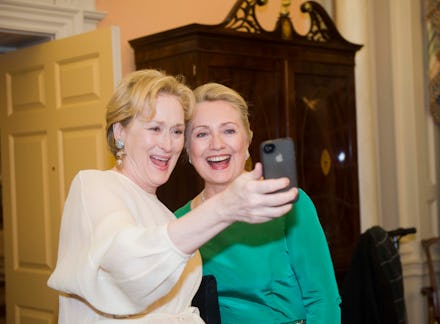One Chart Proves Our Smartphones Aren't Making Us More Anti-Social

If town criers still existed, they might yell something like this: "Rid yourself of all ye olde cellphones! Destroying the fabric of society before our very eyes, they are! Poisoning our social connections!" Those hand-wringing men and women would be mistaken: A new study on mobile phone etiquette from the Pew Research Center's Internet, Science and Technology division reveals findings that may just soothe the fears of those anti-cellphone naysayers.
In a nationwide poll of 3,217 adults, 3,042 of whom use cellphones, researchers found that although people may be glued to their phones in social settings — parties, dinners, dates, meetings — they're not using their tech to hide from reality. Actually, those phones were enhancing their social lives.
"Many cellphone owners are using their mobile devices while out in public for a variety of reasons, and while their visible actions might seem rude or inconsiderate to an outside observer, in many instances they are using their phone to further their social engagement with others," wrote the report's authors.
According to the study, a full 45% of respondents used their phone to post a photo or video of the event at which they were present; 41% used it to share something that happened by text message, email or social platform; and 31% used it to communicate with other people known by the group.
On the contrary, only 16% used their cellphones because they no longer cared about what their friends were doing, and a mere 10% used it to specifically avoid interacting with the group.
"People are not hooked on their gadgets," Lee Rainie, director of Internet, science and technology research at Pew and one of the report's co-authors, told Mic. "People [who] worry about social isolation, or social destructiveness of people focusing on their screens, are forgetting that when people are on their screens, they're doing social stuff. It's not just the screens versus the humans. It's the different ways we interact with humans."
"It's not just the screen versus the humans. It's the different ways we interact with humans."
But the study also highlighted an interesting double standard. In the summary, Rainie and co-author Kathryn Zickuhr emphasized that while we spent a good deal of time on our cellphones during social gatherings, we don't actually approve of the behavior.
"As a general proposition, Americans view cellphones as distracting and annoying when used in social settings — but at the same time, many use their own devices during group encounters," they wrote.
It's puzzling but ultimately not surprising behavior, according to Rainie.
"This is not a unique phenomenon. Humans wish for things, and don't actually act in ways that are consistent with [that]," he told Mic. "When people see others using their cellphones, they're [mad] about it ... but when they pick up the phone in the midst of a social gathering, they can self-justify about why this could be helpful, or 'I'm doing this because I need to,' or 'I'm doing this because there's some urgent thing I need to get accomplished.'"
Rainie described his own fascination with the gap between these societal, macro-level attitudes and our own micro-level behavior.
"What's so interesting to me about this is that cellphones are now being used to expand the boundaries of social encounters," he said. "We're watching the culture rewrite the rules of etiquette, and actually, in a bigger sense, rewriting the rules of social norms ... it's been an interesting struggle. There are rules of how to behave, and now those rules are being challenged."
So, when will this kind of behavior become the norm? Relatively soon, if the difference in attitude between different generations is any indication.
"Young adults have a higher tolerance for cellphone use in public and in social settings," the study noted. Among adults aged 18 to 29, 49% reported they often use their cellphone to coordinate plans while out in public; just 12% of seniors said the same. Similarly, a whopping 98% of young people used their cellphone at least once during their latest social gathering, compared with 69% of adults older than 65.
As these young people age — and begin to edge out baby boomers for biggest share of the population — they will likely bring their digital-native sensibilities with them, Rainie said. After all, for many young people, this kind of behavior is inherited, not learned.
"You can just feel that social norms are going to change in the coming years as folks think that this is just a normal part of human existence," he explained. "You can just imagine culture, 20 to 30 years from now, is going to be in a very different place from where it is now."
In other words, the knee-jerk "You're an asshole!" response that inevitably bubbles up whenever people use their phones in public may soon dissipate faster than the tears of your technophobe relatives as they stare into the screen of the future.